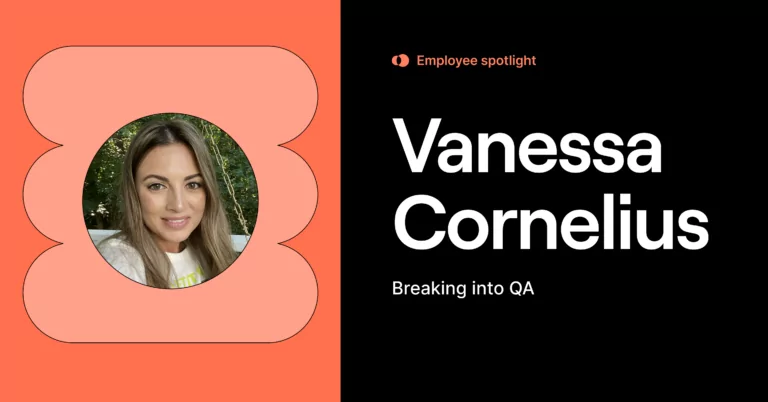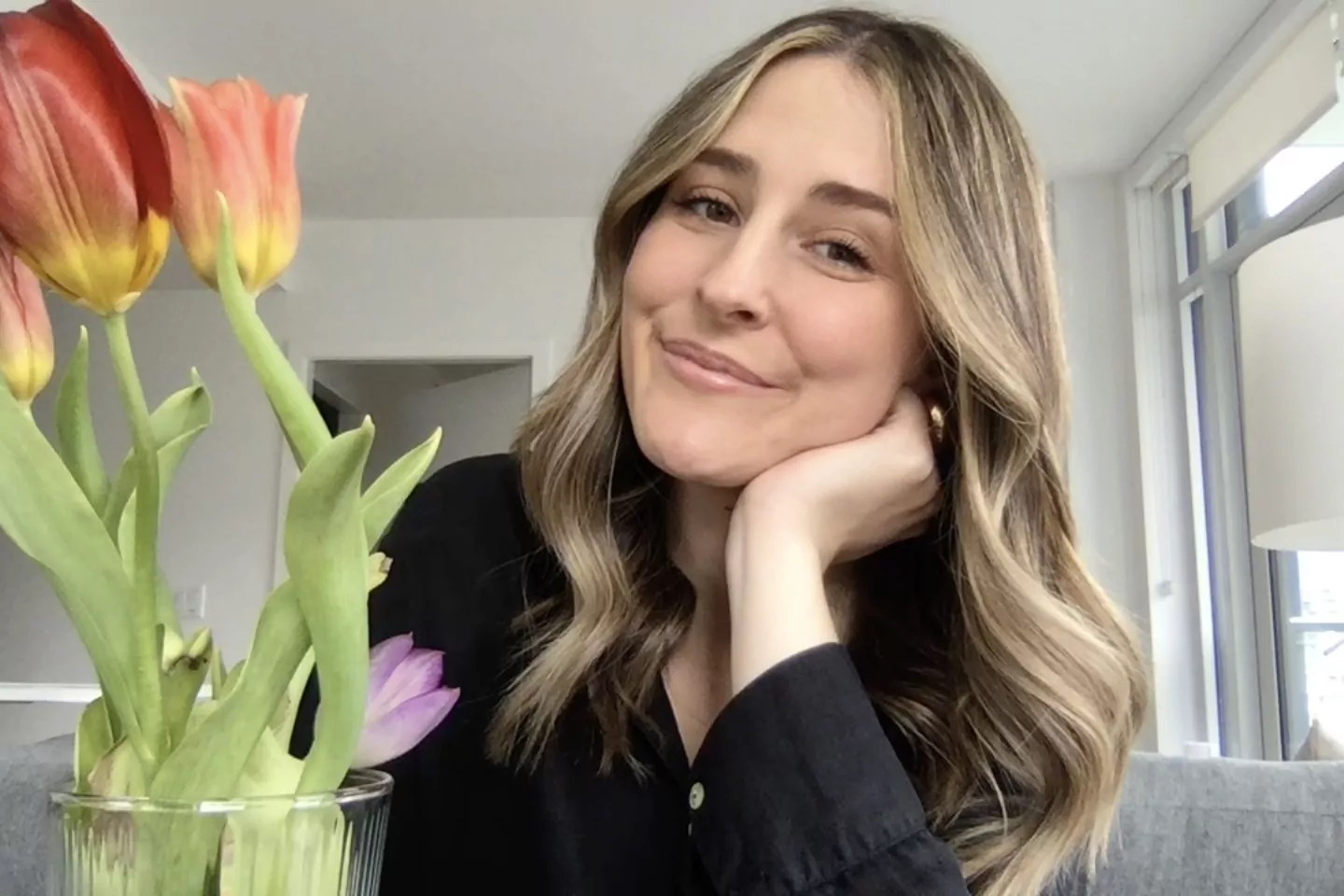Have you ever wondered what it takes to become a QA engineer? It’s a role that requires a unique set of skills and knowledge, but it doesn’t necessarily mean you have to have a computer science degree.
In this interview, we sat down with Vanessa Cornelius, our very own QA engineer, to learn about her journey into the field. Vanessa shares her story, including what led her to QA, her experience in the industry, and how she’s found success without a traditional computer science background.
Whether you’re considering a career in QA or simply curious about the field, Vanessa’s insights are sure to inspire you.
Steph: We hear the title “QA,” but what does Quality assurance actually mean?
Vanessa: QA is all about testing a product’s quality from the user’s point of view. I approach it by putting myself in the customer’s shoes and asking, “Does this work the way it’s supposed to work?” My main goal is to make sure that we deliver a product that’s free from bugs and with a great user experience.

Steph: How did you get into this field? Was it something you’ve always wanted to do?
Vanessa: Getting into QA was a bit of a serendipitous journey for me. I was in a place where I wanted something new, something that I could be passionate about. I had been working as a behavioral therapist while pursuing my degree in psychology, but I realized that it wasn’t really my calling.
I’ve heard people say that if you’re able to do what you love—work becomes something you enjoy rather than a chore. And that’s something that I wanted.
In college, I took a personality test that revealed my analytical and organizational strengths. I found that I enjoyed using my curiosity and problem-solving skills to figure out how things worked, and knowing this helped me in my research for jobs. Most of the job listings seemed to be in management or business, but I found an ad on LinkedIn that caught my eye. It asked if I had an interest in AI and offered training for the necessary skills. It also mentioned “breaking things,” which I wasn’t even sure what that meant or whether or not I was into it at the time, but I decided to give it a shot. Turns out it was a QA position.
I guess you can say that I’ve stumbled into this role, but I think it’s a perfect fit for me. It allows me to use my analytical skills to test products from the user’s perspective and ensure that the customer has a seamless experience which is driving that passion that makes work not feel like work.
Steph: Seems like everything was meant to be
Vanessa: Yeah, initially, I wasn’t aware of what the role of QA entailed until I began working on it. During the interview process, the hiring manager informed me that the position was for a project and that it wasn’t full-time but rather contract work. But she saw potential in me and was confident that she could train me. She said she liked my personality and could teach me everything else, and I thought, “Why not?”
As I began training, I saw how skills like being organized and curious were exactly what a successful QA tester needs. I learned to think flexibly and try different approaches, which was challenging but also exciting. I always wanted to be learning and grow, and this job gave me that opportunity.
Steph: Let’s talk a little bit more about those soft skills that are not explicitly mentioned in the job description but could contribute to someone’s success in this field.
Vanessa: Communication is key in this role, both written and verbal, because you need to be able to clearly describe any issues to multiple people involved in the project. While I’ve always been good at written communication, I used to struggle with speaking up in meetings. I’ve since worked on it and improved.
Flexibility is also important, especially when unexpected issues arise. You have to be able to problem-solve and pivot when needed. These are the things that I’ve grown to love and excel at. In fact, it’s one of my favorite things about QA — no two days are ever the same.
Documenting processes and being detail-oriented is also crucial in QA, as it ensures that everyone is on the same page and that work can continue even if someone is absent. I take pride in my ability to self-manage and get things done, and I credit that to my life experiences where the focus was on accomplishing goals no matter what.

Steph: What led you to come work here at OpenPhone, and what has been your experience working with other teams and collaborating across departments?
Vanessa: I came across OpenPhone when I was ready to take on a product-driven challenge after doing a bunch of contract jobs. I was looking for a company that was not already stuck in a process and had room for growth and learning. At first, I didn’t know what OpenPhone was until I started researching it. It was still new and small at the time, so there wasn’t a lot of feedback from other employees. But during the interview process, I realized that this company was different.
Everyone here sounds like a human, and I instantly felt at home.
What I love most is that OpenPhone is a startup. I knew that there was plenty of room for growth and opportunities since there were not any strict processes in place; you can create and trial some to find out what works best.
I enjoy working with my team. Here, QA and the devs are considered a single team which has never been the case in past roles. Here, we are encouraged to collaborate, and every time I ask for help, I have the opportunity to learn something new.

In my previous roles, it was like I was a hidden part of the role, and no one really knew what QA did. Here, it’s different; it’s important, and it stands out. I get to explore other sides of it, and it’s not just the QA part.
OpenPhone is unique, and I believe that it’s a company that I can be in for a while. I want to work with people who are like-minded and care about each other and the product.
Steph: If someone wants to learn about QA or other engineering roles, what resources would you recommend?
Vanessa: I didn’t know LinkedIn had a “LinkedIn Learning” until recently. I like their courses because you get a certificate after completing them and can test yourself on what you’ve learned. The courses can be short or long, and you only need a LinkedIn membership to access them. Even in my job as a QA, some technical terms might not be currently used, but they might come up in my next role or project.
It’s important to keep learning and staying up-to-date with skills, as you never know what might be useful in the future.
Udemy also has affordable options for more in-depth topics. And I always recommend speaking to people in the field, job shadowing, and taking courses to see if it’s something you’ll enjoy doing before committing to it.

It’s great that OpenPhone encourages us to explore areas outside of just our job scope. We’re given an educational budget that can be used to help us continue learning more things which I think is fantastic because I have never had that opportunity before.
Steph: We know why you like working at OpenPhone, but why do you like using the product?
Vanessa: I just love that it’s unique and practical. Let me explain. Before I joined, I used to work in sales for a family business that provided telecommunications services. However, selling these services was becoming more challenging because there were many options out there. This made me realize that having a product that is both useful and unique is essential for a successful business.
The product is great because it solves a real problem.
Many entrepreneurs and small business owners need to stay connected on the go. This need becomes more apparent during natural disasters like hurricanes, which I have recently experienced. Our service allows them to use their phone number and stay connected even when they can’t physically be in their office. Plus, the trial period is generous so that you can try it out risk-free.
What sets us apart is the clean layout and ease of use. It’s available on multiple platforms, customizable, and bug-free. It just makes sense. Our approach creates a great experience for everyone, regardless of age. I truly believe that this product will appeal to different generations because it is so intuitive.
Moreover, it’s affordable, and it helps businesses stay organized and efficient with features like group calling and internal threads. The future will bring even more features, such as transcription, that will make OpenPhone even more appealing. It’s a no-brainer. It just makes sense, and I would encourage everyone to give it a try.

